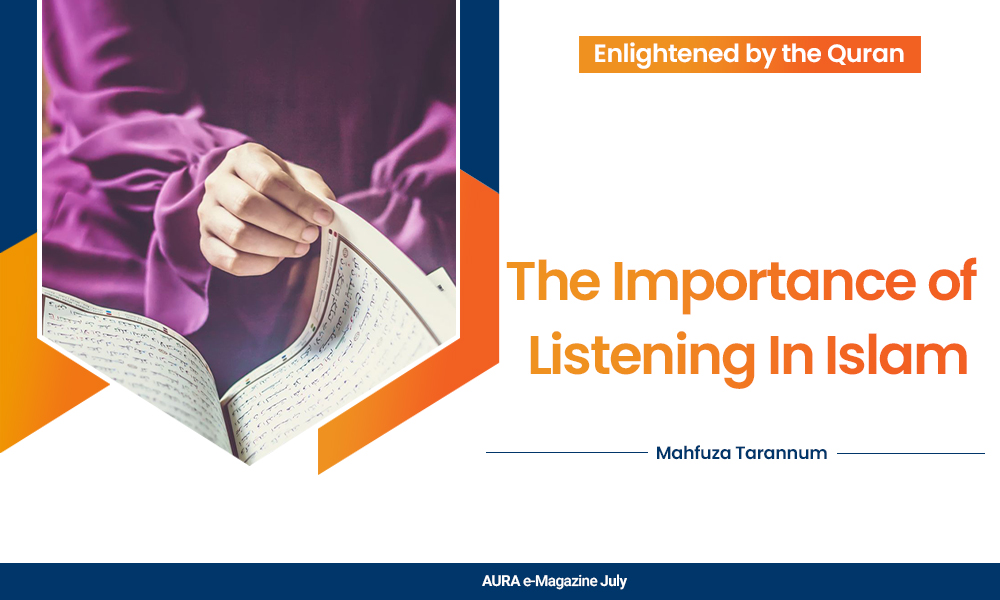“And they say, ‘We hear and obey.” Al-Quran 2:285
This verse highlights the significance of adhering to Allah’s commands by listening and obeying. The etiquettes embedded in Islamic teachings aim for the welfare of everyone. Speaking and listening have their respective etiquettes, with listening being a skill that needs to be developed. Below are some ways to improve listening skills
One. Being silent and attentive: The first step to effective listening is to be silent and attentive. This shows respect for the speaker. Scholars have emphasised that the first lesson in acquiring knowledge is attentive listening. Being distracted by looking around or using a mobile phone is not characteristic of an ideal listener. Allah instructs in the Qur’an to listen attentively when it is being recited:
“When the Qur’an is recited, listen to it attentively and remain silent, so that you may receive mercy.” (Surah Al-A’raf, verse 204)
This shows the etiquette of being silent and following the Qur’an’s commands. Attentive listeners are praised in the Qur’an:

“Those who listen attentively and follow the best of it, they are the ones whom Allah has guided, and they are the wise.” (Surah Az-Zumar, verse 18)
Proper etiquette involves waiting to comment until after the speaker has finished, fostering mutual love and intimacy.
The following hadith further emphasises the importance of listening to the Qur’an:
“Whoever listens to the recitation of the Qur’an attentively will be rewarded multiple times, and the reciter will be elevated on the Day of Judgment.” (Musnad Ahmad: 8494)
The Prophet Muhammad (PBUH) recited the Qur’an to his companions, who listened with deep interest. Abdullah Ibn Mas’ud (RA) narrated that the Prophet (SAW) asked him to recite the Qur’an, saying, “I like to listen to the recitation of others.” (Bukhari: 5056)
Benefits of listening to the Qur’an include:
- Receiving Allah’s Mercy: Listening to the Qur’an attentively brings down Allah’s mercy.
- Earning Allah’s Praise: Those who gather to recite and listen to the Qur’an are praised by Allah among the angels.
“When a community gathers in a house of Allah to recite and discuss the Qur’an, peace descends upon them, Allah’s mercy covers them, angels surround them, and Allah praises them to His angels.” (Abu Dawud: 1455) - Guidance: The Qur’an guides believers to the best path and brings them glad tidings. “Surely this Qur’an guides to the path that is best and gives glad tidings to the righteous believers that there is a great reward for them.” (Surah Al-Isra, verse 9)
- Increasing Faith: Reciting and listening to the Qur’an increases a believer’s faith. “Those are the believers whose hearts tremble when Allah is mentioned, and when His verses are recited to them, it increases their faith.” (Surah Al-Anfal, verse 8)
- Creating Light in the Heart: The Qur’an brings the light of guidance to the hearts of believers, leading them to repent and seek Allah’s forgiveness. “O you who believe, repent to Allah with sincere repentance. Your Lord will forgive your sins and admit you to Paradise. Your light will shine before you and on your right. They will say, ‘O our Lord, perfect our light for us and forgive us. Surely You are Powerful over all things.” (Surah At-Tahrim, verse 8)
- Reward: There is a reward for listening to the Qur’an, though scholars note it may not equal the reward for reciting it.
Listening to the Friday and Eid sermons is also emphasised. Abdullah bin Sa’ib narrated that the Prophet (PBUH) said after the Eid prayer, “We will give a sermon; whoever wants to listen, let him sit, and whoever chooses to leave, let him leave.” Believers should be interested in beneficial things for this world and the hereafter, and listening to sermons provides great benefits.
Two. Smiling: Smiling while listening is a good listening etiquette. On the authority of Abu Dharr (R.A), he said that the Prophet (S.A.W) said to me, ‘Do not despise any act of virtue. Although you can meet your (Muslim) brother with a smile.’ (Meeting with a smile is also an act of virtue). (Sahih Muslim, Hadith: 2626)
Three. Non-disclosure: Do not disclose any secret during a mutual conversation. On the authority of Anas Ibn Malik (may Allah be pleased with him), he said: I once told the Prophet (may peace be upon him) a matter in secret. I didn’t tell anyone after him. Umm Sulaym (RA) asked me about it. But I didn’t tell him either. (Sahih Bukhari, Hadith: 6289)
In another narration, on the authority of Jaber Ibn Abdullah (RA), Rasulullah (SAW) said, When a person turns his face after saying something (to see if anyone has heard it), it is as a deposit. (Sunan Abu Dawud, Hadith: 4868)
Four. Don’t listen to slander: Allah Ta’ala has prohibited backbiting, but He has also banned listening to others’ backbiting & faults. On the authority of Abu Darda (RA), the Prophet (PBUH) said, “Whoever resists injury to the honour of his brother, Allah will prevent the fire of Hell from his face on the Day of Resurrection.” (Jamee Tirmidhi, Hadith: 1931)


0 Comments